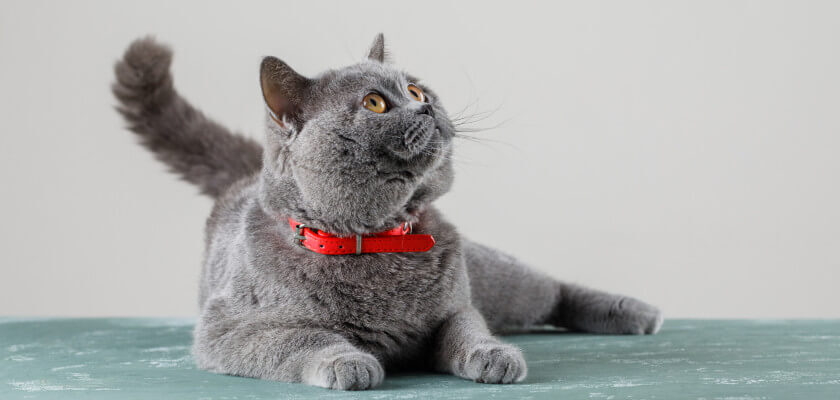Many cat owners associate purring with the state of happiness which their cat is in. In reality, there is much more behind this noise than a simple pleasure. Of course, cats may purr when they are happy and feel good. However, for some of them, it is a form of expressing some negative emotions and feelings such as hunger, pain, or even fear. Moreover, purring can be a form of natural treatment after your cat gets hurt, which is pretty much similar to vibration therapy in humans.
How do cats purr?
Unlike big cats such as lions, tigers, and leopards, smaller wild felines (for instance cheetah and lynx) and domestic cats are able to purr. Purring is a complex mechanism that activates three different parts of a cat’s body:
- brain,
- larynx (a part of the throat also called the voice box, which allows air to pass from the external environment to the lungs),
- diaphragm (the muscle which is responsible for breathing).
The mechanism of purring is as follows: The cat’s brain sends messages to their voice box and diaphragm, causing them to oscillate and put tension on the cat’s glottis (which contains vocal cords). As muscles around the cat’s vocal cord twitch, the purring noise we all know is generated. The frequency of twitches ranges from 25 to 150 vibrations per second, which allows laryngeal muscles to produce a low and continuous sound that is easily audible by humans. What makes purring distinctive from other forms of vocalization is that the sound can be produced when your cat inhales and exhales the air.
When do cats purr?
Cats are able to vocalize from their first days in the world. It is no surprise that even the smallest felines are able to meow, squeal, or purr. All these sounds are vital for their survival, as they help kittens communicate their needs and express their emotions and feelings. Mother cats use purring sounds in communication with their newborn offspring to mark their presence, as kittens are born blind and deaf. When it comes to outdoor cats, purring also serves a supplementary function: it allows cats to stay safe from predators which are unable to detect purring vibrations.
What does it mean when a cat purrs?
In the past, it was believed that cats purr in order to communicate with others. However, recent studies have shown that these unique sounds can also express emotions, both positive and negative, such as contentment, fear, anxiety. Surprisingly, when your cat purrs excessively, it can also be a sign of possible injuries. In many other cases, purring is just a way your pet is trying to grab your attention.
Check out the most common reasons why cats purr.
1. They want your attention
As we have already mentioned, kittens use purring in order to communicate with their mother and tell her what they need and how they feel. They usually transfer this behavior to their new parents and purr once they want something. This is how they try to capture your attention.
2. They’re content
Interacting with people, animals, and objects they love is what usually makes adult cats purr. When your cat feels good, e.g., when you pet or cuddle them, a simple purr may be proof of their well-being.
3. They need you
Cats also purr when they want to ask you for help. If they’re hungry or desperately want something, instead of meowing, they can produce low-frequency vibrations resulting in a soft buzzing sound.
4. They are fearful
A cat’s body language can be misleading. Sometimes the same signals sent by your feline may mean totally different things. This also applies to the sounds they make. Experts believe that cats often purr to express their fears and anxiety. For instance, if you are planning to take them to the vet, they might purr at you!
5. They are in pain
Self-healing is one of the reasons why kitties purr. The low frequency of muscle twitches can have a strong therapeutic effect on the body. It can boost the regeneration of bones, as well as increase the pace of wound healing and stimulate muscles growth. Once your cat is in pain, they may be purring to feel relief.
Should I be concerned about my pet’s vocalizations?
When your cat purrs, the best thing you can do is to carefully observe them and pay attention to any changes in their daily habits. If they vocalize as a response to being cuddled or because they want something, e.g., feeding time is approaching, there is nothing to be worried about. However, if your cat begins to purr for no apparent reason and moves away from you, this may be a sign of possible health issues. If it is concurrent with other disturbing symptoms, for instance, vomiting, problems with urinating or defecating, you need to react as quickly as possible. The best thing you can do in such a situation is to take your little friend to the vet.
Similar Posts:
- Understanding Cat Language: Why Do Cats Meow?
- Do Dogs Laugh? Can You Make Your Dog Laugh?
- Do Cats Cry? All About Meowing And Kitty’s Tears
- Why Does My Cat Chirp or Chatter? Reasons Behind This Cute Sound Cats Make
- Why does my cat lick me? 5 common reasons
- Why do the cats wag their tail, and what does it mean?
- Do Cats Know Their Names? Let’s See What Science Says About That
- Why do cats hiss? Issues behind hissing & how to solve them

